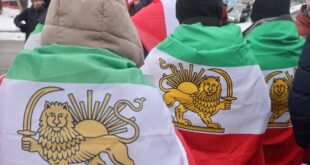 Iranian President Mahmoud Ahmadinejad rejected the congressional testimony of the top US officials in Iraq accusing Iran of interfering in its war-torn neighbor. He also said the Islamic Republic could help in Iraq if the US and British governments stopped alleging it is fighting a proxy war there by arming Shiite Muslim militias accused of attacking coalition forces.
Iranian President Mahmoud Ahmadinejad rejected the congressional testimony of the top US officials in Iraq accusing Iran of interfering in its war-torn neighbor. He also said the Islamic Republic could help in Iraq if the US and British governments stopped alleging it is fighting a proxy war there by arming Shiite Muslim militias accused of attacking coalition forces.
In an interview on Iranian state television, Ahmadinejad said Gen. David Petraeus and Ambassador Ryan Crocker raised allegations of Iranian meddling solely because of the political debate within the United States over the war in Iraq.
“These comments are the result of their domestic competition. Our stance on Iraq is quite clear, but they made a mistake and keep repeating it,” he said in a live interview.
“Iran has no need to interfere in Iraq. The Iraqi government and nation are close friends of Iran,” he added.
Later, in an interview broadcast by Britain’s Channel 4 television, Ahmadinejad denied charges that Iran supplies weapons to Iraq’s Shiite groups or allows bomb-making technology to be passed to insurgents, saying Iranians don’t benefit from having a neighbor in conflict.
“We are the country that gets damaged a lot by Iraq’s insecurity,” he said.
Ahmadinejad said Iran would be able to help calm Iraq if Washington and London dropped their hostile attitude.
“We can help solve many problems in Iraq; we can help secure Iraq; we can help the attackers and insurgents go out of Iraq, if the American and British governments correct themselves,” he said, speaking through a translator.
He said Iran’s help is needed and urged Washington to accept it failed in Iraq. “If you bring 10 times more forces you still cannot succeed there. Victory awaits no one in Iraq,” he said.
Ahmadinejad stressed that a quick US pullout from Iraq would bring calm and security to the region.
“If the US leaves the region, there will be more friendship, and Iran, Iraq and Saudi Arabia would fill the power vacuum,” he said. “We are ready to help providing security. We are natural allies.”
In another area of contention between his government and the West, Ahmadinejad said Iran will not suspend uranium enrichment despite the threat of tougher UN sanctions. He again insisted Tehran is not trying to develop nuclear weapons, as alleged by the US and its allies.
“We do not want the bomb. We are against the bomb, actually,” said the president, who says the program is intended only to produce fuel for nuclear reactors that would generate electricity.
Earlier in the day, the State Department said US diplomats would press for tougher UN Security Council sanctions on Iran during a Sept. 21 meeting with five other nations that have sometimes reluctantly used the body’s punitive powers in the dispute over Tehran’s atomic program.
US diplomats have not been specific about what they want the Security Council to try next, and some European diplomats are predicting contentious discussions among the six powers.
A senior Iranian envoy accused Western nations on Wednesday of “poisoning the environment” at a key meeting of the UN nuclear watchdog agency in Vienna, Austria.
Ali Asghar Soltanieh, Iran’s chief delegate to the International Atomic Energy Agency, said the United States and its allies were unfairly playing down successes of the agency’s investigation into his nation’s nuclear past.
 Eurasia Press & News
Eurasia Press & News



